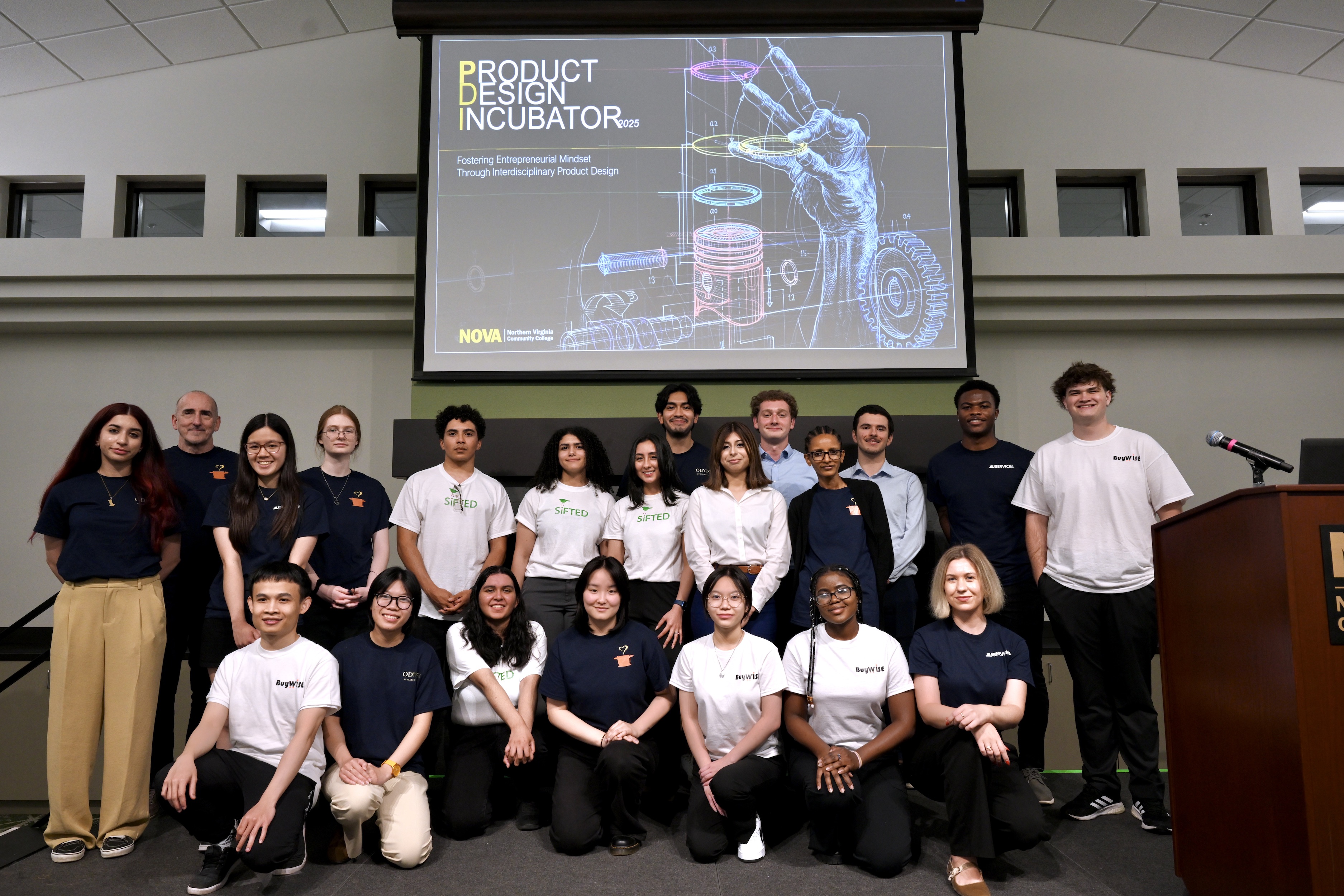On June 13, NOVA Fab Lab hosted its Product Design Incubator (PDI) Pitch Event at the Richard J. Ernst Community Cultural Center on NOVA’s Annandale Campus. The event featured 21 fellows from the third PDI cohort, who presented innovative product ideas focused on improving government services, reducing the stigma around food assistance, curbing impulsive grocery spending, supporting teen and young adult mental health, addressing the societal impacts of artificial intelligence, and enhancing nutrition.
Funded by the National Science Foundation (NSF), PDI took place at NOVA’s Manassas Campus in the Fab Lab and was designed to equip students with interdisciplinary product design skills. The program was developed in direct response to feedback from industry partners, who emphasized the need for candidates with not only technical expertise but also strong collaboration, communication, problem-solving, critical thinking, creativity, and innovation skills.
Richard Sewell, Fab Lab Coordinator, led the program alongside IET Project Manager Chris Russell and Associate Professor of Business Administration Cameisha Chin. Together, they built a program that fosters an entrepreneurial mindset—a way of thinking that empowers students to approach challenges with creativity and initiative, regardless of their field or career path.
The spring semester kicked off with ideation workshops, where students identified and defined problems, then conducted user research. Over the following month, students worked in residence at the Manassas Fab Lab to develop prototypes, marketing materials, and formal pitches. Several fellows from the previous cohort returned as mentors, supporting teams during pitch practice and final presentations.
The event culminated in a series of formal presentations and networking opportunities, celebrating the students' hard work and creativity.
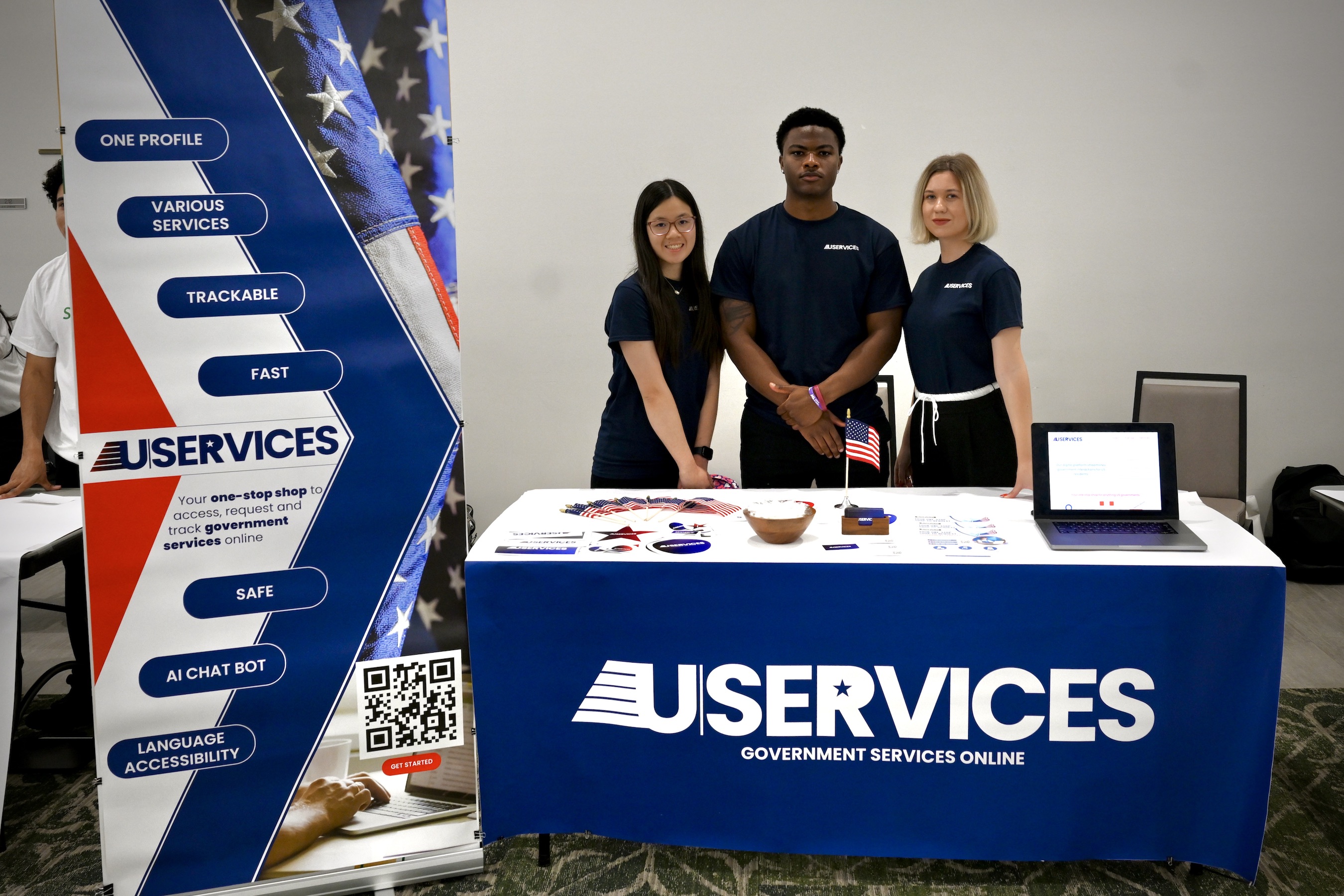
Computer science fellow Jahleel Jackson, business fellow Vy Tran, and visual arts fellow Kristina Rublevskaia developed “UServices,” a digital platform streamlining access to government services. Inspired by one fellow’s personal challenge and another fellow’s family immigration challenge, the team created a one-stop portal where users can complete a single profile to request and track multiple services—like visa applications and vehicle registration—with real-time updates. Survey data showed widespread frustration with delays and inefficiency. Planned features include multilingual support, mobile alerts, document verification, and in-person assistance. A free trial and flexible pricing model are also in development.
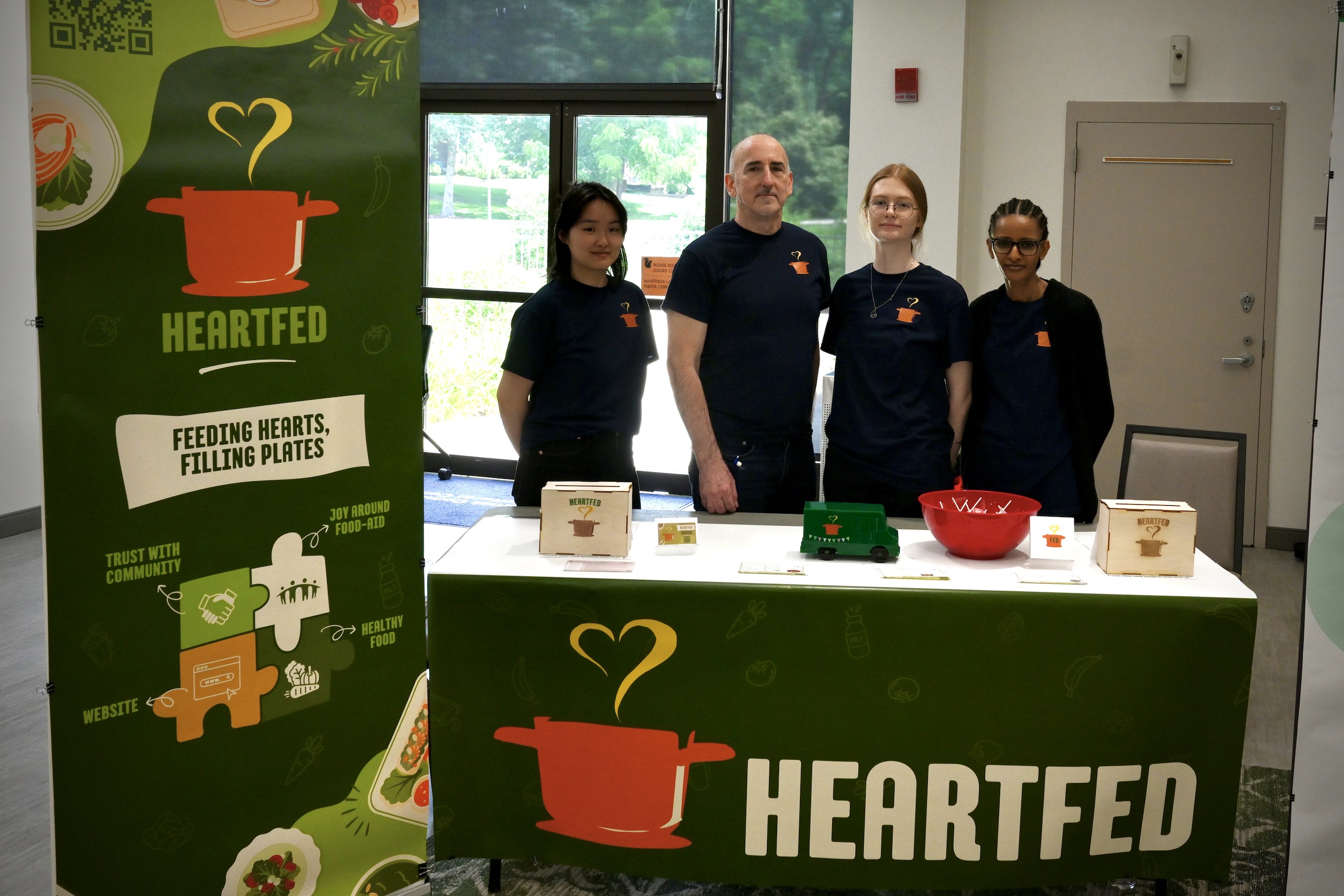
General studies fellow Raven Thomas, graphic design fellow Khongorzul Munhgerel, architecture fellow Mahder Gebeyehu, and cybersecurity fellow Dave Slaughter created “Heartfed,” a mobile platform aiming to make food aid shame-free and community-centered. Their research revealed stigma often prevents students from seeking help. “Heartfed” addresses this by pairing nutritious meals with engaging, event-based experiences—like meal kits, health education, and campus activities. Their pilot pop-up will launch at NOVA’s Manassas Campus, starting with the Nighthawk Nest pantry, with the goal of reducing stigma and building lasting campus-community connections.
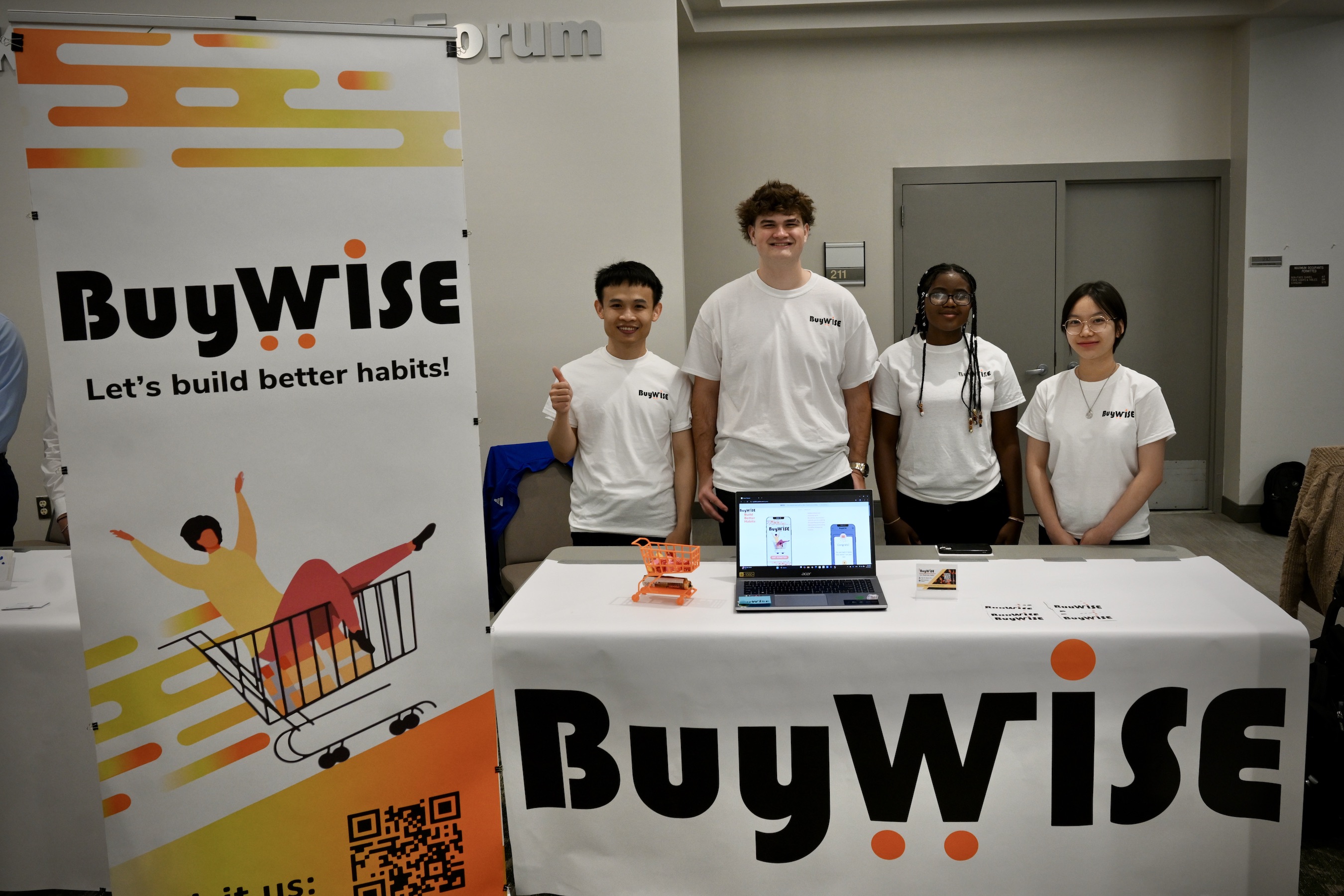
Mechanical engineering fellows Erin Tran and Benjamin Corliss, health science and IT fellow Nguyen Tran, and business administration fellow Ange Aghomo developed “BuyWise,” a mobile app that helps reduce impulsive grocery spending. Using AI image detection, the app identifies items added to a cart and prompts users with questions to encourage mindful choices. A benefits page tracks money saved and items put back, reinforcing better habits. Features include list imports, product suggestions, and a subscription model with a phone mount for in-store use.
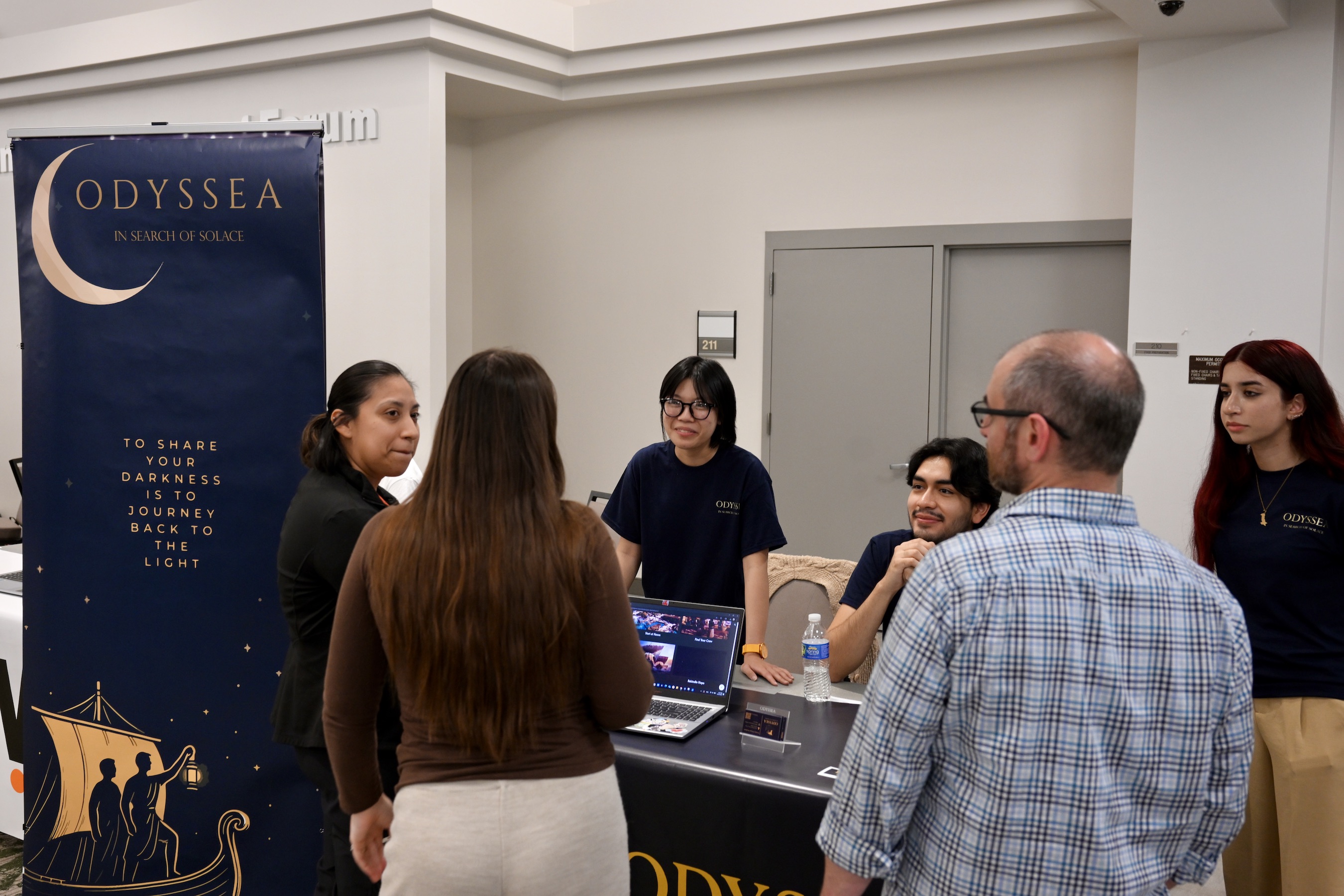
Computer science fellows Ariel Ticona and Irene Tran, along with mechanical engineering fellow Aiysha Aslam, created “Odyssea: In Search of Solace,” a video game that supports teen and young adult mental health through community, storytelling, and shared gameplay. Inspired by Ariel’s personal experiences, “Odyssea” offers a safe, multiplayer environment where players explore a mythical Mediterranean world and complete missions that foster connection and healing. Built around psychological principles like automaticity, co-regulation, and affect labeling, the game centers emotional well-being. Future plans include mental health partnerships, ongoing updates, and a $20–30 retail launch.
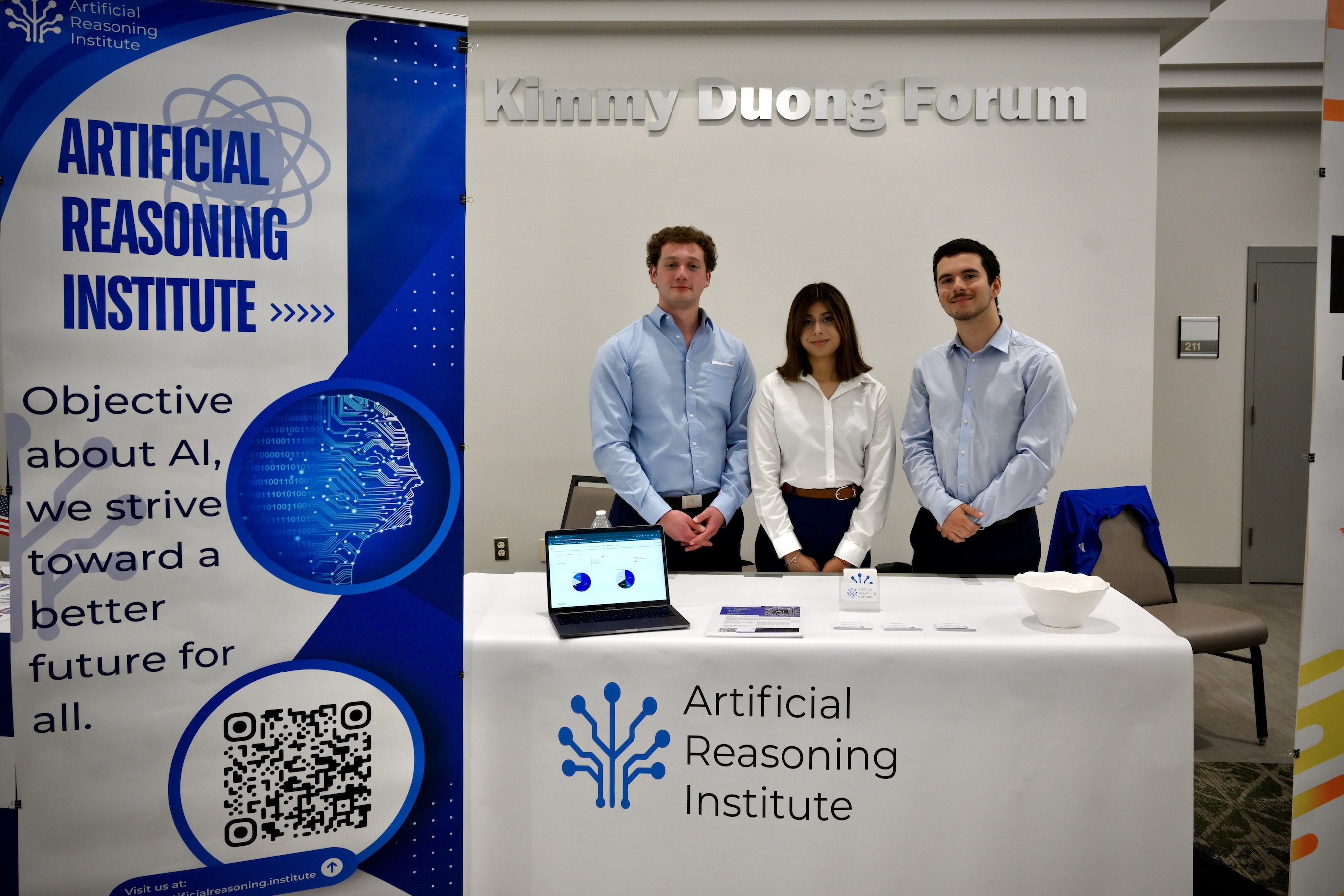
Business administration fellows Cyrus Sharafi and Tiffany Orellana, along with computer science fellow Tayven Stover, developed the “Artificial Reasoning Institute (ARI)”—a nonpartisan, nonprofit think tank focused on the societal impacts of artificial intelligence. Responding to growing public anxiety and ethical concerns around AI, ARI will produce research, advise policymakers, guide businesses, and inform the public. Their model emphasizes transparency, accessibility, and ethical oversight. With plans to secure 501(c)(3) status and publish annual reports, ARI aims to become a trusted source for responsible AI development.
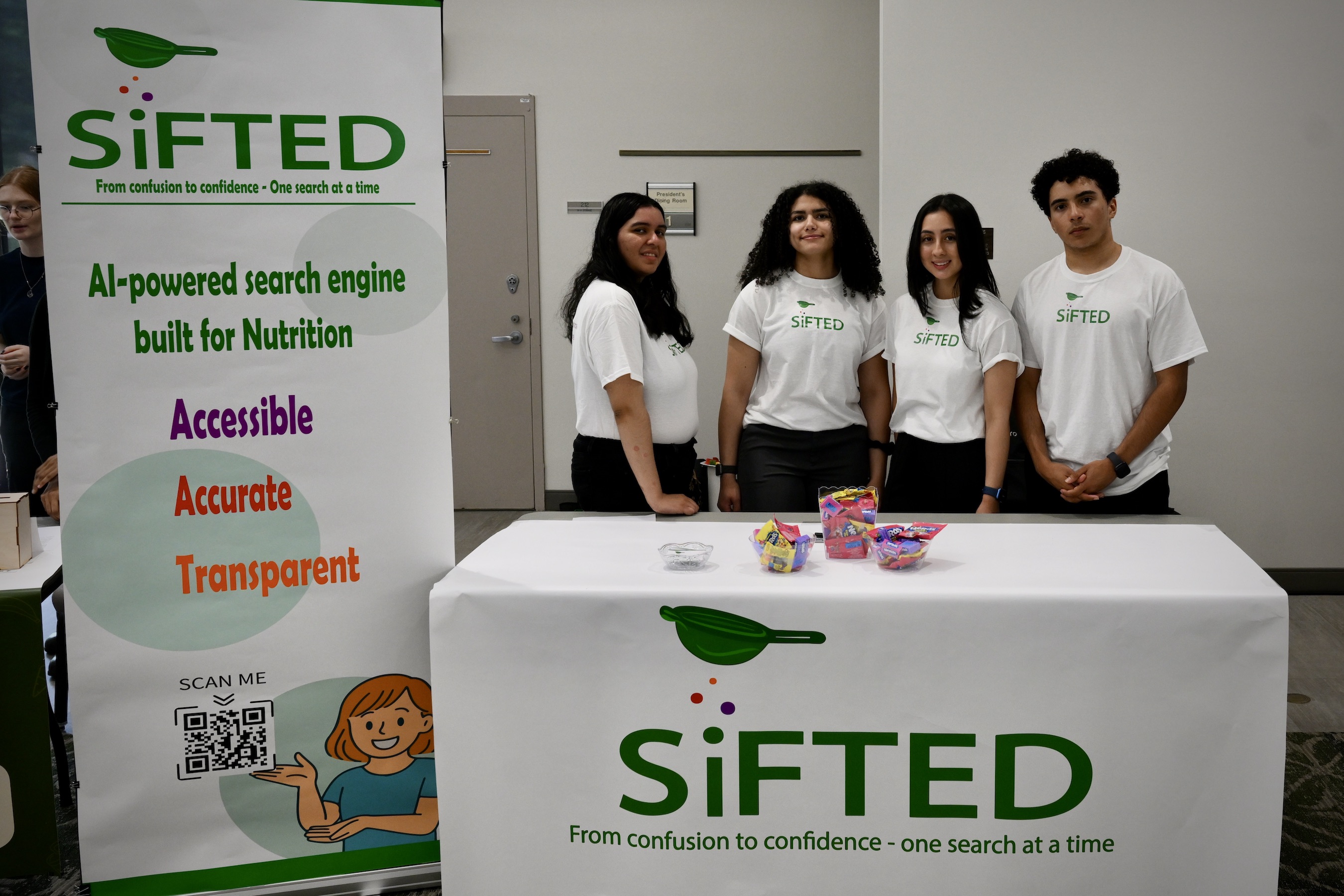
Engineering fellows Somayah Hussein and Donovan Edwards, computer science fellow Lina Chimasuque, and art fellow Stephanie Merino developed “Sifted,” a nonprofit nutrition search engine designed to cut through misinformation. Powered by a language model trained exclusively on peer-reviewed research, the platform delivers personalized, science-backed answers in easy-to-read formats. Unlike general tools, “Sifted” focuses solely on nutrition, avoids ads and sponsorships, and prioritizes transparency. Growth plans include partnerships, campus outreach, and a donation-based funding model with optional subscriptions for unlimited searches.
Feedback
“Watching from the other side has been a completely different—and exciting—experience,” says Stephanie Marino, a PDI fellow from the prior cohort and current mentor. “I finally understood the mentor’s excitement instead of just feeling nervous on stage. Supporting them was truly rewarding. It inspired me, opened my mind to how things work, and even gave me a glimpse of what my own future could look like.”
“I loved it,” says Judy Marouf, a PDI fellow from the prior cohort and current mentor. “I came in each Friday to watch their pitch practices and help fine-tune their presentations. Each week, their confidence and delivery improved—it was amazing to watch. Seeing their final presentations, with banners, shirts, logos, and business cards, really brought everything to life. They looked so happy, and knowing how I felt on my pitch day, it meant a lot to see their smiles. I’m really glad about how this new cohort went. The redesigned program clearly made a difference—they got so much out of it.”
“I think they did amazing,” says Anosha Khairi, a PDI fellow from the prior cohort. “It’s much more relaxed on this side—just watching their work come together. It’s great to see students get the chance to bring their ideas to life. Not everyone gets that opportunity—usually, it takes a lot of hardship. But here, they could just brainstorm and build something together. It’s really nice to see.”
“It’s great to see the program still going—it’s clearly grown,” says Jaden Todd, a PDI fellow from the prior cohort. “It benefits the students, staff, and even the audience. Compared to last year, the training has improved a lot. Some students told me they received public speaking guidance much earlier, which is amazing. The materials feel more polished, and the students' ideas were incredible—some of them were things I wouldn’t have even thought of. It feels great to come back and see how far it’s come.”
“Overall, I think each team put real thought into their project,” says Ravi Gorur, a serial entrepreneur who attends the PDI each year and offers feedback to the fellows. “They all identified interesting problem statements—some, like “Heartfed” and “Odyssea,” were especially compelling because they addressed real, urgent needs. The others were compelling in their own ways.”
He offers specific feedback: “BuyWISE” is interesting, though changing consumer behavior is tough. “Artificial Reasoning” tackles a major issue, but maintaining neutrality could be a challenge. “Sifted” has a lot of potential—training a model on the right data opens up many possibilities, though the nonprofit model could be limiting. “UServices” is promising too; frequency of use gives it potential as a consumer product, even if scaling might be difficult.”
Ravi emphasizes that every team should think carefully about their go-to-market strategy. “That’s the hardest part,” he says. “Some will find it easier than others, but if they focus on their customers and gather feedback, everything else can fall into place.”
